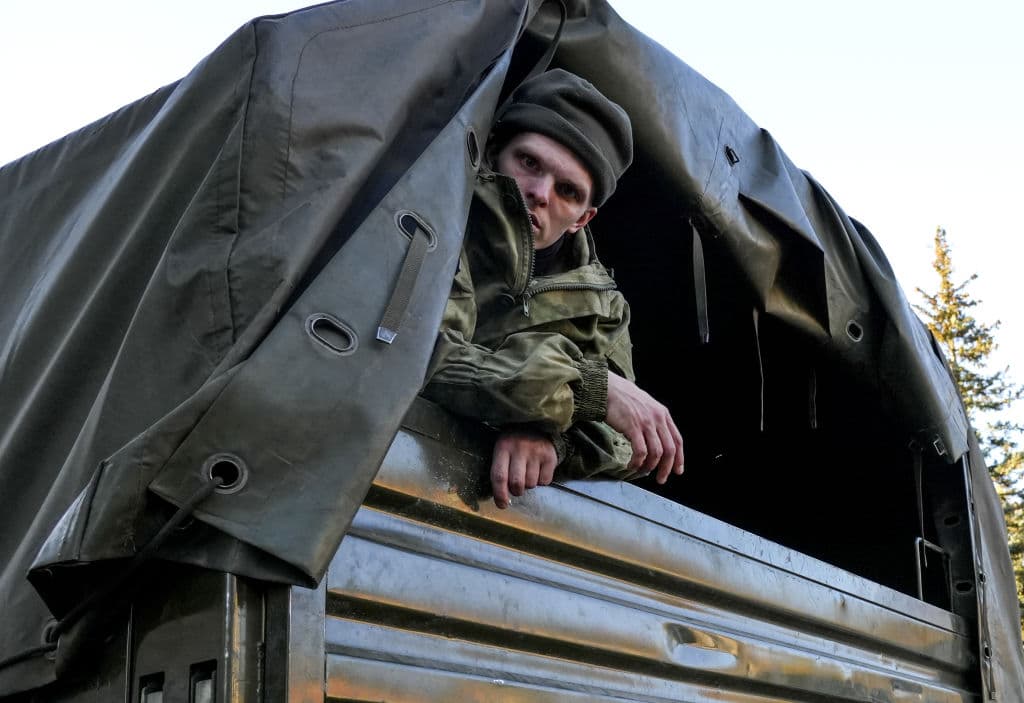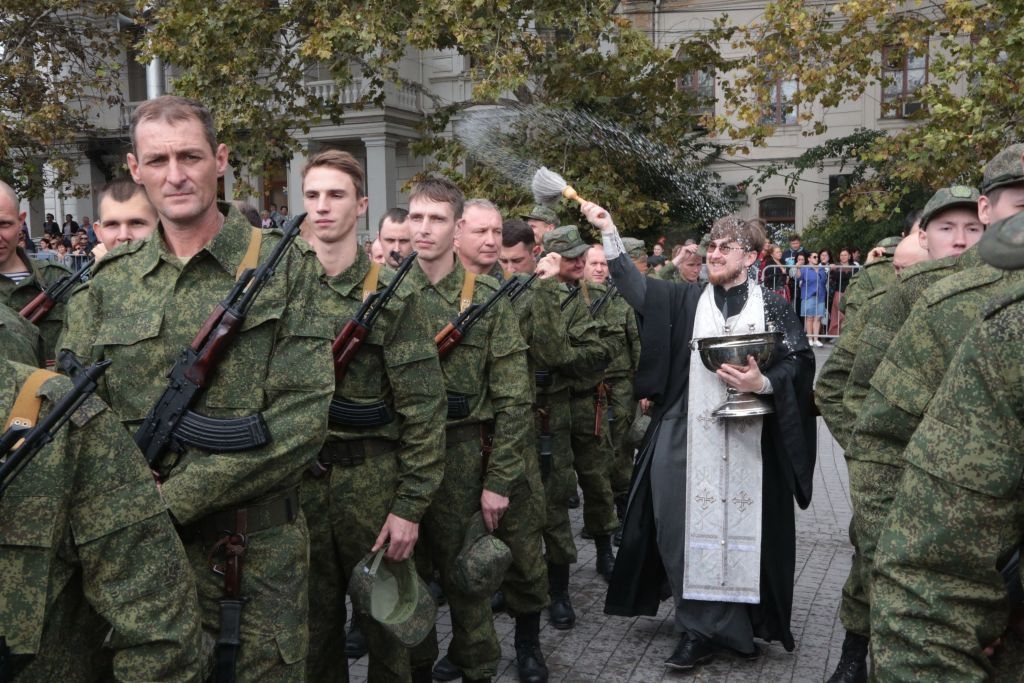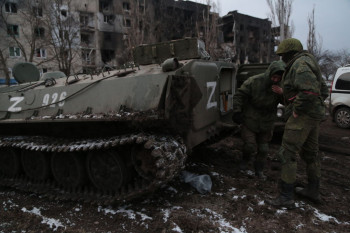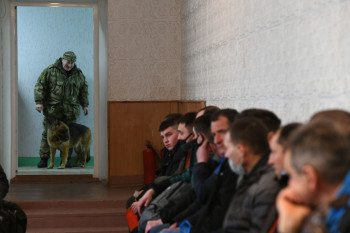Ukrainians in Russia fear mobilization: ‘If conscripted, I will shoot Russians and surrender’

Editor's note: The names of the people interviewed by the Kyiv Independent for this story have been changed to protect their identity as they have shared sensitive information that could place them and their families in danger.
When Russia's President Vladimir Putin announced partial mobilization, Ivan was desperate.
Ivan, who fled Russian-occupied Donetsk in 2021 and is now a Russian citizen living in Novosibirsk in Siberia, realized he could be sent to fight against his native Ukraine. The prospect of being sent over 3,500 kilometers to be used as cannon fodder in Russia's brutal conquest terrified him.
Ivan, his colleagues, and friends were glued to local Telegram channels that were sharing unofficial lists of those in Novosibirsk who would be called up to serve.
"Everyone was frantically looking for their names," Ivan told the Kyiv Independent.
Russia declared in September that it would mobilize 300,000 conscripts to fight in Ukraine, but independent Russian media outlets have reported that the actual goal is north of a million.
Despite Putin's declaration that the mobilization would only include former military personnel, multiple reports have confirmed that men of all ages and professions are being conscripted. Ethnic minorities appear to be called up disproportionately. Media outlets have also reported on recent conscripts being killed in action and captured as POWs in Ukraine.
Among the conscripts are Ukrainians who received Russian passports following Russia’s invasion of Donbas and Crimea in 2014–both those who were forced to take up Russian citizenship and those who did so voluntarily.
Ivan, who now regrets obtaining a Russian passport while living in Russian-occupied Donetsk, says he won't shoot at the people he loves.
"They (Russians) want to send me to fight against Ukrainians, my people. I will not shoot at them. If I'm deployed, I will shoot Russians and surrender to Ukrainian forces," Ivan told the Kyiv Independent.
Russified by choice
Russia invaded Ukraine in 2014, occupying Crimea and parts of Ukraine's eastern Donetsk and Luhansk oblasts. Soon, it began a forced russification of the local population.
In occupied Crimea, everyone was given a Russian passport and treated as Russian citizens. In occupied parts of Donbas, Russia gradually increased the process of handing out Russian passports, often forcing citizens to have Russian citizenship in order to obtain employment.
Ivan decided to get a Russian passport in order to move to Russia as his hometown, Donetsk, had become "a hopeless place" after years of Russian occupation.
"Nobody forced me to receive a Russian passport," Ivan said, separating himself from people who were forced to do so.
When obtaining a Russian passport and moving from occupation, being drafted didn't worry him. He was 36, well over the usual compulsory conscription age, which is 18 to 27 years old.
Yet when Putin launched emergency mobilization in Russia, the age limit was increased to 50.

"I will surrender to the Ukrainian forces if conscripted. And I don't want to be exchanged to Russia if I'm a prisoner of war," Ivan said while dusting off the Ukrainian passport he keeps hidden.
Bound by the Geneva Conventions, Ukraine will not swap captured Russian citizens if they don’t want to return to Russia, said Mykhailo Podolyak, an advisor and unofficial spokesman of the President's Office.
Despite not being drafted yet, Ivan's chances of being forced to fight remain high.
Yet another war crime
Putin “declared” martial law in Russian-occupied regions of Ukraine on Oct. 19. The measure, while illegal, could be used to justify tighter control over essential infrastructure and public transportation.
The decree bans people from leaving the regions, greenlights Russian forces to deport people into Russia and confiscate their property, and establishes so-called “territorial defense units.” To fill those units, Russian troops plan to forcibly recruit locals.
In Russian-occupied Donetsk, Oleksii knows a thing or two about forced conscription. Like thousands of others, he has been hiding at home for over eight months as Russian proxies grab people from the street and send them to the front lines, usually as cannon fodder to halt Ukraine's counteroffensive.
When Putin announced mobilization, "nothing changed for me," Oleksii told the Kyiv Independent. Local proxies had launched a forced mobilization campaign from day one of the full-scale war.
In an attempt to cover yet another war crime, the Kremlin sped up passportization so that Russia could conscript more Ukrainians now labeled by Russia as "Russian citizens." Forcibly mobilizing people from occupied territories goes against the Geneva Conventions, to which Russia is a signatory.
Following Putin’s announcement annexing four Ukrainian regions – Donetsk, Luhansk, Zaporizhzhia, and Kherson oblasts – the Kremlin-controlled Russian Constitutional Court ruled that everyone in the occupied Ukrainian regions is now a Russian citizen.
The only way to not obtain a Russian passport in those regions is to officially write a request not to receive a Russian passport.
But even showing up to fill out the paperwork for such a request could be dangerous, Oleksii told the Kyiv Independent.
Another native of Donetsk, Dmytro, has left the occupied region of Ukraine in 2021 and is currently in Russia’s city Rostov. He is a Ukrainian citizen and doesn’t want to obtain a Russian passport. But after the Kremlin declared “annexation” of Donetsk Oblast in September, technically he can be considered subject to mobilization in Russia.
If he is conscripted, his plan is to rely on corruption to evade going.
"I will go into hiding and try to resolve this issue in a local hospital," Dmytro said, referring to a bribe.
All three men – Ivan, Oleksii, and Dmytro – say they don't want to die for Russia.
The mobilization of a disproportionate number of indigenous people of Russia's Buryatia, Yakutia, Tuva, and Dagestan regions raised new worries that the suffering would not be distributed fairly throughout Russia.
"This includes the genocide of Ukrainians living in Russia,” said Ivan. "Russia is well aware that these people are Ukrainians and deliberately sends these people to war."
"One little man (Putin) has stolen many, many lives," he added.












